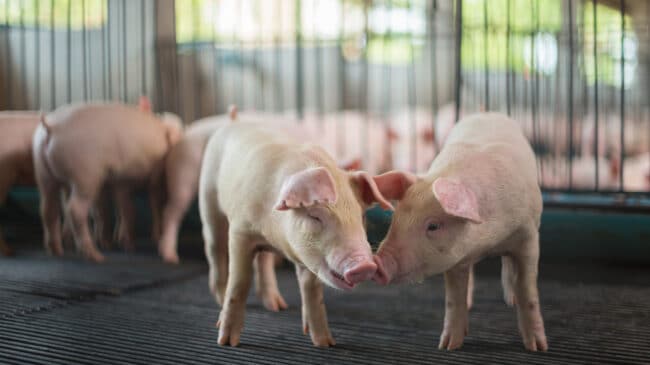The U.S. Supreme Court recently heard arguments in a case that could have an enormous impact on the future of animal agriculture and the availability of meat—and the price consumers pay for it.
The case pits the National Pork Producers Council and the American Farm Bureau Federation, representing the nation’s leading pork producers—who raise, slaughter, and process meat from pigs for sale across the country—against the state of California.
The plaintiffs, Reuters reported, “are appealing a lower court’s decision to throw out their lawsuit seeking to invalidate a 2018 ballot initiative passed by voters barring sales in California of pork, veal[,] and eggs from animals whose confinement failed to meet minimum space requirements.”
As I explained in a column in April, after the Supreme Court agreed to hear the appeal, that ballot measure, Proposition 12, was adopted in 2018 by nearly two-thirds of California voters. Prop. 12 prohibits confining livestock “in a cruel manner” and requires livestock animals whose meat, offspring, or eggs will be sold in California to be confined in spaces large enough that they have sufficient room to lie down, turn around, or spread their wings. Those found to have violated the law could face fines and possible jail time.
As California’s Department of Agriculture explains, the law applies to “animals raised on farms within or outside of California.” Given that very few pork producers are based in California—the state imports more than 99% of its pork—the intended and actual impact of the law will be borne by farmers raising livestock on farms outside of California.
What’s more, although Californians consume around 15% of the nation’s pork, only around 4% of pork producers nationwide currently meet California’s standards. In other words, Prop. 12 deems 96% of the pigs raised by farmers across the country to have been raised “in a cruel manner,” and their meat, hence, cannot be sold in California. Prop. 12, then, could dramatically curtail or even effectively ban the sale of pork in California while harming the national economy and farmers and consumers in states across the country.
The lawsuit the Supreme Court heard this week asks whether California’s Proposition 12 violates the dormant Commerce Clause by impermissibly interfering with animal agriculture in the states that provide pork to buyers in California—from restaurants to grocers to everyday consumers. As I’ve explained, the term “dormant Commerce Clause” means “that because Congress has plenary authority over interstate commerce under the Commerce Clause, individual states necessarily lack such power”—hence the clause’s dormancy as pertains to state governments.
Notably, one of the primary reasons for including a Commerce Clause in the federal Constitution, leading scholars have explained, is that in the years between the signing of the Declaration of Independence and the adoption of the federal Constitution, “[s]tates [had] erected an assortment of trade barriers to protect their own businesses from competing firms in neighboring states.”
In highlighting their arguments as they pertain to the Supreme Court’s relevant dormant Commerce Clause jurisprudence, the pork producers’ June 2022 brief to the Supreme Court declares:
A state law runs afoul of the negative implications of Congress’s power ‘[t]o regulate Commerce among the several States’ if its ‘practical effect’ is to ‘control [commercial] conduct beyond the boundaries of the State,’ even if the law is ‘triggered only by sales’ occurring ‘within the State.’ A state law also is unconstitutional if it imposes a burden on interstate commerce that is ‘clearly excessive in relation to the putative local benefits.’ (internal citations omitted)
During oral arguments this week, Timothy Bishop, attorney for the pork producers, explained to the Supreme Court justices that Prop. 12 is unconstitutional under both of the above prongs. “Proposition 12 violates the Commerce Clause almost per se because it’s an extraterritorial regulation that conditions pork sales on out-of-state farmers adopting California’s preferred farming methods, for no valid safety reason,” Bishop told the Supreme Court. “Proposition 12 also… burdens interstate commerce for no local benefit.”
The Biden administration agrees. It rightly sided with the pork producers, asserting in an amicus brief “that states cannot ban products ‘that pose no threat to public health or safety based on philosophical objections.’”
In questions to attorneys during Tuesday’s oral arguments, the Los Angeles Times reported this week, Supreme Court Justices appeared “wary” and “skeptical” of Proposition 12, “warning it could set off a wave of state laws that put a wide array of restrictions on products moving nationwide.”
Justices across the political spectrum envisioned ways states could retaliate against each other should they reject the pork producers’ arguments and uphold the California law. “Progressive Justice Elena Kagan wondered what would happen if Democratic states banned the sale of goods made by non-unionized workers,” Yahoo! News reported. “Her conservative colleague Amy Coney Barrett imagined that [some states] would ban goods from companies that did not fund medical care for their transgender employees.”
Importantly, the report also notes, the case has forced the nine justices to “ponder the criteria that would allow comparable cases to be resolved in the future.”
These are exactly the right questions for the Supreme Court to ask. Years ago, I pondered what a related California animal-rights case could ultimately mean for the nation’s food economy. I used a hypothetical example of drought conditions—which are terrible and worsening in California—and what might happen if other states were to ban sales within their borders of foods grown or produced in states experiencing drought conditions.
“If California may dictate standards for raising animals in other states, then any state—in keeping with the hypothetical, let’s say Iowa—could pass a law that prohibits, say, farmers from raising crops in drought-stricken areas,” I wrote. “The justification? It’s not a good use of water, and water should be conserved (rather than exported in the form of produce) in times of drought. Since California is in the midst of a decade-long drought, then that rule would effectively bar California crops from Iowa. If a handful of other states followed, then the rule could doom California agriculture.”
Such a ban might apply to everything from California’s oranges to its avocados, beef, poultry, olives, and wine—to name just a few foods. Depending on the number and size of the state or states that were to adopt such an anti-drought law, the impact on California’s farming communities and the state’s economy as a whole could be devastating. That’s why this case will likely have wide-ranging implications beyond the pork industry and even beyond California.
As I explained in a 2010 Chapman University Law Review article, The “California Effect” & the Future of American Food: How California’s Growing Crackdown on Food & Agriculture Harms the State & the Nation, laws passed in California can impact every American. Much of that is due to the state’s clout, stemming from its massive geographic size and enormous economy. But it’s just as true that California has a growing number of food laws—from Prop. 12 to the state’s equally unconstitutional foie gras ban—that force businesses located in other states to adhere to those California laws, even if laws in their states are less restrictive.
As I detailed to the Supreme Court in an amicus brief submitted on behalf of Reason Foundation and the Cato Institute in 2018, upholding a California animal-rights law that seeks to regulate farm conditions in 49 other states risks and “could ultimately destroy our national market in food.”
That market is essential to America’s past and present, and—if the Supreme Court rules in favor of the pork producers later this year—will be to its future as well.

